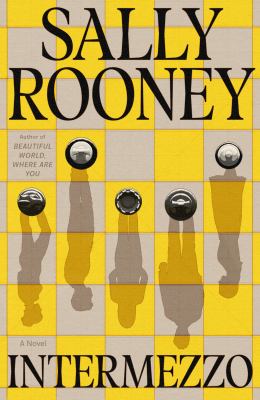If Sally Rooney has a million readers, then I am one of them. If Sally Rooney has one reader, then I am that one. If Sally Rooney has no readers, then I do not exist. If Sally Rooney… you get it.
What I’m trying to say is, I am honored to present you with my review of “Intermezzo”—Sally Rooney’s recent, gorgeous offering to the world of contemporary fiction, in which her celebrity already looms large. (I am honored, really, to have read it at all.)
Returning Rooney readers will find familiarity here: Elegant, intelligent characters, thrillingly plain conversation, sudden tenderness at every turn, bonds that seem to originate from the soul. A woman who is very ill, vulnerable always to pain; a man tortured by the movements of his heart, acting with both extreme sensitivity and destructive force. A wealth of worthy quotes:
Nights he no longer has to spend trapped in claustrophobic solitude, self-medicated, panic attack or am I dying how to tell. Instead the deep replenishing reservoir of her presence.
These are the lines I love, the ones about people’s effects on each other. This particular line comes from Peter’s narrative, and the replenishing womanly presence is that of Sylvia — an important distinction, because there is also Naomi, whose effect on Peter is less like a reservoir and more like a waterfall.
He is in love, of course, with both Sylvia and Naomi, but it will take everyone some time to realize this. Peter’s emotional realizations are slowed by grief. His father has died, and Peter has made the interesting choice to avoid processing this loss with his only brother, Ivan.
Peter is 32. Ivan is 22. According to everyone they are starting to look alike, but they don’t think so — To Ivan, Peter is the glamorous, vapid lawyer, a little unreal. To Peter, Ivan is the chess-obsessed loser, narrowly rescued (by Peter) from inceldom. And it’s more complicated than that, but it kind of isn’t. These brothers fail constantly to see the beauty and the worthiness in themselves and each other, the way they always have.
But other people see — Sylvia, Naomi, and Margaret. Margaret is 36, and in love with Ivan. Margaret has powerful and confusing feelings about the difference in age between them, feelings Ivan makes room for but doesn’t really understand. Because to Ivan, loving Margaret is a miracle, a vocation. For the first time in his life, he has no doubts or questions:
Nothing he has done or felt in this regard before has prepared him remotely for this new experience, with Margaret: the experience of mutual desire. To feel an interpenetration of thought between the two of them, understanding her, looking at her and knowing, yes, even without speaking, what she feels and wants, and knowing that she understands him also, completely.
While I’ve been carrying this book around, other Rooney readers have shown interest: How do you like it? I like Ivan’s narrative voice: heartfelt despite his evidently “flat, affectless” speaking voice, the reverence and patience with which he considers the things precious to him (Margaret, chess, the dog); this in contrast with Peter’s jolting, visceral monologue.
How do you like it? The sweetness within the bitter complexity: Naomi’s head on Peter’s shoulder after the party, Sylvia’s friendship with Ivan which exists, mercifully, outside of Peter and within its own bubble of fondness, Margaret and Ivan’s quiet weekends together. Despite the confounding factors, this book is romantic — not enough to ever let you relax, but just enough to let you indulge.
And the atmosphere: We are in Dublin, on college campuses, on rain-slicked streets walking home from the bar, in cozy apartments, in the city and the countryside. These are lush settings for angst and grief. For every suffocating moment there is a door to burst out of, a fog to walk into, a train window to gaze from. When I turned the last page I had the feeling of finishing a cup of coffee, reaching the bottom of something strong and warming.
“Normal People,” Rooney’s star-making 2018 novel, ends like this:
All these years they’ve been like two little plants sharing the same plot of soil, growing around one another, contorting to make room, taking certain unlikely positions. But in the end she has done something for him, she’s made a new life possible, and she can always feel good about that.
Sally Rooney has always been interested in soulmates, and in what it means to need each other. At the end of “Normal People” her soulmates part, giving way to the questions: What happens when two people have done all that they can for each other? How do you let someone go while holding onto the gift they gave you, of goodness, of relieving you of the feeling of unworthiness?
“Intermezzo” asks different questions: What if you give in to your need for other people, keep all your plants in the same plot of soil, watch how they grow into each other, become something new?
Tags: angst, brothers, chronic pain, competitive chess, grief, Ireland, multiple perspectives, OnlyFans, the dog doesn’t die



